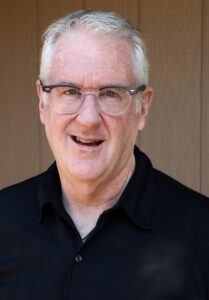
For years we’ve been inundated with dire news and dire predictions about the “decline of the church.” As a journalist and ministry leader, I’ve been one of the inundators. But over the last few years I’ve stopped using the word “decline” and started using the word “pruning” to describe what’s happening in the church. “Decline” implies a kind of market downturn driven by customer dissatisfaction. But “pruning” redirects our attention to a Master Gardener who is hard at work, cutting away of what is impeding the church’s growth. Declines among the people of God have no foundation in Scripture, but prunings do.
My new book Editing Jesus, releasing June 4, makes the case that when the church tacitly abandons its source of life (the unedited Jesus we encounter in Scripture), God’s cutting shears come out. Jesus is explicit about this: “[God] cuts off every branch of mine that doesn’t produce fruit, and he prunes the branches that do bear fruit so they will produce even more” (John 15:2). The evidence reveals, from a gardener’s perspective, that the Western “branch” of the church is producing shriveled versions of “love, joy, peace, patience, kindness, goodness, faithfulness, gentleness, and self-control” (Galatians 5:22–23). God’s pruning work is intended to produce new growth and new life in the church. But in the short-term, the process is painful. Those severed leaves on the ground represent all we’ve held precious… The cost seems high.
‘What Is There Really to Mourn?’
The Atlantic’s Derek Thompson, a self-proclaimed agnostic, says the crisis facing the church has had the opposite impact on him: “I have spent most of my life thinking about the decline of faith in America in mostly positive terms. Organized religion seemed, to me, beset by scandal and entangled in noxious politics. So, I thought, what is there really to mourn?” But as the decline (or the Gardener’s pruning) has accelerated, Thompson says he’s had a profound change of heart. “Maybe religion,” he says, “for all of its faults, works a bit like a retaining wall to hold back the destabilizing pressure of American hyper-individualism, which threatens to swell and spill over in its absence.”
In his piece “The True Cost of the Churchgoing Bust,” Thompson compares the exodus from the church to a restaurant whose menu and service have so degraded that people no longer want to go out to eat. The great loss, he says, is the way that restaurant brought people together for community and connection. In the same way, he says, the growing repugnance (or simple disinterest) that the “Nones” have for the church has created a culture-wide relational poverty. We have filled the hole created by this retreat from communal worship with screens—we have shifted our relational energies from in-person connections that fill the soul to screen-based connections that sap the soul.
Thompson says: “What’s undeniable is that nonreligious Americans are also less civically engaged. This year, the Pew Research Center reported that religiously unaffiliated Americans are less likely to volunteer, less likely to feel satisfied with their community and social life, and more likely to say they feel lonely.” In his piece Thompson quotes Eric Klinenberg, a sociologist at NYU: “It’s hard to know what the causal story is here. [But] clearly more Americans are spending Sunday mornings on their couches, and it’s affected the quality of our collective life.”
The Rebirth That’s Coming
We are relational creatures, made in the image of a relational God. And the church’s role is to invite people into a kind of community that is not only family-like, but deeper in love and commitment than our DNA family. At Vibrant Faith we call this “familying,” and it’s the focus of our new podcast “Familying the Faith.” Maybe, just maybe, the pruning we’re experiencing today will lead to a rebirth in the primacy of in-person community, bound together by a superseding love for the beauty and redemption we experience in the heart of Jesus.
Thompson concludes: “Making friends as an adult can be hard; it’s especially hard without a scheduled weekly reunion of congregants. Finding meaning in the world is hard too; it’s especially difficult if the oldest systems of meaning-making hold less and less appeal. It took decades for Americans to lose religion. It might take decades to understand the entirety of what we lost.” That’s a fitting ending for an agnostic, but it’s important for us as followers of Jesus to remember His perspective on “what we have lost”:
“I tell you the truth, unless a kernel of wheat is planted in the soil and dies, it remains alone. But its death will produce many new kernels—a plentiful harvest of new lives” (John 12:24).
If you would like help as you explore planting a more intentional Jesus-centered environment in your ministry ecosystem, reach out to connect with a Vibrant Faith Ministry Leadership Coach. Just CLICK HERE for more information. Coaching is an intentional process that moves you forward into the future you long for.

Rick Lawrence is Executive Director of Vibrant Faith—he created the new curriculum Following Jesus. He’s editor of the Jesus-Centered Bible and author of 40 books, including The Suicide Solution, The Jesus-Centered Life and Jesus-Centered Daily. In the Spring of 2024 his new book Editing Jesus: Confronting the Distorted Faith of the American Church will be published. He hosts the podcast Paying Ridiculous Attention to Jesus.
[activecampaign form=5]
 A Deeper Way to Lead Others Into Faith Maturity… Guide your people into depth relationally and experientially… A new curriculum by Rick Lawrence for both youth & adult ministries. Learn More Here
A Deeper Way to Lead Others Into Faith Maturity… Guide your people into depth relationally and experientially… A new curriculum by Rick Lawrence for both youth & adult ministries. Learn More Here



